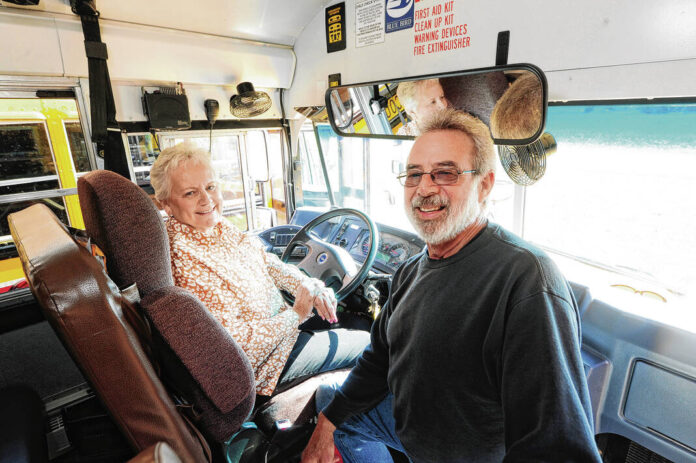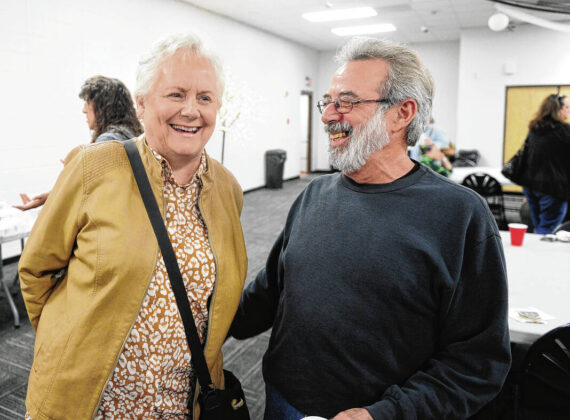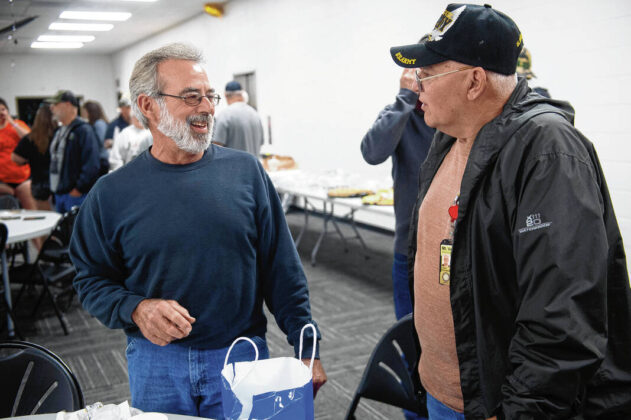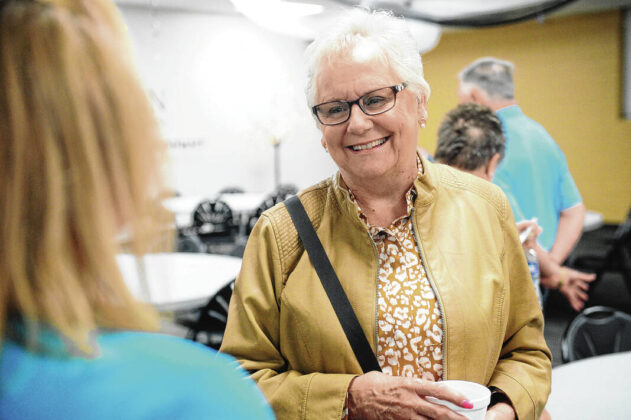
Mt. Vernon school corporation employees Marcia Marshall, who has 45 years as a bus driver, left, and George Rafert, who’s leaving after 46 ½ years as a bus technician, have both retired.
Tom Russo | Daily Reporter
HANCOCK COUNTY — A lot of memories can fit into nearly half a century, and many of them make George Rafert and Marcia Marshall laugh.
One of the biggest bursts came from some friendly ribbing as the two remembered working winters throughout their long careers in bus transportation for the Mt. Vernon Community School Corporation.
“We seemed to have a lot of snow in the late ’70s, early ’80s,” Marshall recalled. “I carried a shovel for a while because I really hated to call George to have him come dig me out. Because usually when he came, he’d have to give me a lesson on how you turn the corner in the snow. I heard that a lot, and I really got tired of hearing that, so I started carrying a shovel with me.”
Rafert has been working on Mt. Vernon’s school buses for 46 1/2 years, and Marshall has been driving them for 45. The two are retiring from the school corporation this spring, capping off long tenures filled with challenges overcome, changes witnessed and gratification felt.
Rafert was 23 when he started as a bus technician at Mt. Vernon, bringing his background in working on cars at a gas station in Fortville.
“Some things come natural, and I knew early on that whatever I did was probably going to be with my hands because I was a terrible student in school,” he said with a laugh.
He had applied for the job a year earlier too, but didn’t get it on account of having never worked on large vehicles before.
“I assured them it was only a big car,” Rafert said. “Had the same components, they were just bigger, some of them. Some of them were the same ones. The engine was the same. Most of the buses had pickup truck engines in them back then.”
Marshall was 30 when she started driving for Mt. Vernon. She had just moved to Fortville with her family. Her neighbor was a substitute bus driver for the school corporation, and encouraged her to get behind the wheel. It was an appealing job prospect for a mother with a daughter in second grade and a son in kindergarten.
“I wanted to do something, but I didn’t want to leave them with the sitter,” Marshall said. “So when they were on vacation, I was on vacation. I didn’t have to work in the summer, I knew all the teachers, I had the opportunity to drive their field trips — go to the (Indianapolis) Children’s Museum and the zoo and all that stuff with them.”
Perfect fit
Rafert’s role grew on him quickly.
“It just fit me,” he said. “When I first started working here, it was just another job. But this was my family, this is my life. My whole life depended on me working here, so I never looked at it as my job anymore, I just looked at it as my life, and this is my family.”
Marshall said her job fit her as well.
“I always have loved it, and people think I guess I gotta be some kind of crazy, because most people don’t think they would ever want to drive a bus full of kids around,” she said. “I just always enjoyed it. And my kids grew up and left me, and then I have four wonderful grandsons and they grew up and left me, but I always had those kids on the bus. Now I’m not going to have them anymore.”
She admires children’s candor.
“They’re my favorite people,” she said. “You never have to guess where you stand with kids, they just tell you.”
A lot of students have gone through Mt. Vernon over the past 45 years.
“These kids have grown up with me,” Marshall said. “I have kids whose parents I took to school.”
It’s even possible, she continued, that some of the students on her bus recently are the grandchildren of past kids she’s driven and maybe even a generation beyond.
“But I don’t want to know that,” she said with a laugh. “If any great-grand-kids rode my bus, I don’t want to know about it.”
Bumps in the road
When it comes to maintenance and repairs, buses don’t necessarily follow school hours or calendars.
“This job is 24 hours a day, seven days a week, and that’s just the way it is,” Rafert said, remembering how the police called him at about 2 a.m. one morning for a bus from an out-of-town school that had broken down in the area.
Rafert said drivers get to know their buses well and can tell when something is wrong, and oftentimes it was his job to figure out what the problem was.
“Most of the time they’re right on, they know something’s wrong, they just don’t know what it is, and sometimes I don’t know what it is, but we find out what it is.”
Several winters ago, water from melting snow got into a diesel tank at Mt. Vernon used to refuel buses, causing seven of the vehicles to break down. It resulted in months worth of fixes requiring 10- and 12-hour days and seven-day weeks.
“That wasn’t a fun three months, wasn’t a fun year,” Rafert said. “That’s one I don’t want to repeat ever for any reason.”
Marshall had a difficult winter during her career as well. In early 1978, during her first school year as a bus driver, a snowstorm walloped Hancock County.
“We didn’t see the ground till spring after that blizzard,” Marshall recalled.
The storm was underway as she prepared to head out on her routes, and she remembered looking out her window and being unable to see her neighbor’s house. It was long before the days of all Mt. Vernon students having devices that allow them to participate in school from home on days of dangerous weather.
“I thought, well, I’m the new kid on the block, I can’t call in and say I’m not going to go,” Marshall said.
She finished her high school route just fine. But later, during her elementary school route, she was coming up Garden Street with the morning sun shining through all that snow and fog, making visibility even more difficult.
“You just couldn’t see anything,” she said.
Garden Street is part of the Hancock-Hamilton County line, and a bus from Hamilton Southeastern Schools was heading in the opposite direction, resulting in a head-on collision.
Marshall broke her hand in the crash, leaving her unable to drive again until later that spring. Several children were checked out at the hospital but none had any major injuries. When Marshall got home that day, she called the parents of all the children on her bus to see if they had any questions about what happened.
“They were all so nice and understanding,” she said.
Changing landscape
Mt. Vernon in the 1970s was far different from what it is in the 2020s.
“It’s been nice to have the same route so many years, because I have gotten to know the families,” Marshall said. “When we first started, this was a small rural school. We’re not so small anymore.”
The school district’s student count grew by 150 last fall to 4,452, surpassing Greenfield-Central for the first time and making it the most populous in the county. Mt. Vernon is projected to have about 6,000 students by the 2029-2030 academic year. A plan is in place that calls for building a new elementary school, expanding Fortville Elementary School and turning it back into an intermediate school, improving traffic flow at the corporation’s main Fortville campus, and building a new transportation center.
Marshall has a couple neighborhoods on her route, but much of it is rural and calls for her to pick up students in their driveways.
“Mostly my route’s out in the country,” she said. “What used to be the country. It’s looking more and more like the city every day.”
Rafert said Mt. Vernon had about 19 buses in its fleet when he started, some of which weren’t even usable. Now, there are 44 along with five special-purpose buses.
He and Marshall saw changes not only throughout their school district, but in their lines of work as well. Training for bus drivers is far more stringent now. When Marshall started, she rode with a bus driver for three days, observing him and driving while he observed when there were no kids on the bus.
“I was nervous at first because I’d never driven anything that big,” she said.
But she had a leg up having driven a tractor as a child and knowing how to shift gears.
“From my experience, in all the years here, there are some people that get in a school bus and it’s like putting on an old shoe, it just fits them,” Rafert said.
Today, it takes several weeks to train to become a bus driver.
Buses themselves are different too. They used to have manual transmissions and now are automatic. Levers that were once required to open doors have been replaced by the simple push of a button.
“You had to shift gears, pull a lever to open the door; you were constantly doing something,” Marshall said.
The COVID-19 pandemic brought plenty of challenges as well, as the federal government required face coverings on buses long after many other masking measures faded away.
“I wore a shield because I wanted — especially the new ones, the little kids — I wanted them to be able to see my face,” Marshall said.
One thing has remained constant, though, she added.
“There’s been a lot of changes in society, but kids are still the same,” she said. “…I just always treated those kids like they were mine, and if you have them on there very long, you feel like they are yours.”
Down the road
Marshall and Rafert are two of 14 Mt. Vernon retirees this school year. Rafert is looking forward to shifting more of his maintenance focus from school buses to the six vehicles he owns, cleaning up the woods on his property and mowing his big yard.
“I’ll miss the people,” he said. “Everybody here. For going on 46 1/2 years I’ve been treated well by everybody I’ve worked with and for. … I didn’t set out to do this, but it happened. I’m happy that it did. What else would I do?”
Marshall is looking forward to traveling with her husband, Ron, and living somewhere warm in the winters.
“I will miss the kids most of all,” she said. “I’ll miss the people I work with.”








